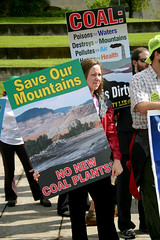
The only thing worse than no climate and energy bill in 2009 is a bad climate and energy bill. No matter how well intentioned, the efforts in the U.S. House of Representatives to frame such a bill have gone from weak to worse – the now all-too-familiar Washington path for tough decision making.
It’s maddening to realize that the more things change in Congress, the more they remain the same. Democrats screamed bloody murder when Vice President Dick Cheney met secretly with representatives of the fossil fuel industry to craft US energy policy. Not to be outdone, Henry Waxman (D-CA), chair of the US House Committee on Energy and Commerce, and Congressman Ed Markey (D-MA) committed the same offense by embracing the utility/coal industry blueprint for climate policy, which is now nestled in Waxman’s so-called American Clean Energy and Security Act.
Is it really better for Americans if Jim Rogers, CEO of Duke Energy, exerts undue influence behind the scenes in calling the shots on energy policy instead of Exxon and Halliburton?
To be sure, there are pro-consumer provisions in the Waxman-Markey legislation. These include two mandates on utility companies. One is the mandate to force electric utilities to provide 25 percent of their power with renewable resources by 2025. The other is a similar mandate for energy efficiency investments amounting to 15 percent of their energy mix by 2020.
These are pro-consumer because energy efficiency and renewable energy investments, particularly when combined in one initiative, are cheaper than business as usual (BAU), meaning coal, nuclear and natural gas investments. Indeed, the savings of the modest mandates in Waxman-Markey could easily amount to well over $500 billion per year by 2030 compared to BAU.
Other than those two provisions, Congressmen Waxman and Markey should just change the name of this bill to the Utility & Coal Industry Profit Enhancement Act. The “cap and trade” provisions for dealing with carbon dioxide (CO2) emissions will only serve to enrich the utility industry and Wall Street hedge managers, while doing little or nothing to reduce carbon emissions. After the debacles in hedge funds and securitized mortgages, why would we create another financial system that is ripe for gaming and abuse?
Another self-serving utility provision promoted by Duke’s CEO in the Waxman-Markey draft legislation is the tax on ratepayers to pay for research and development of carbon capture and sequestration (CCS). If anyone watched Rogers’ interview with 60 Minutes a few weeks ago, they saw how he admitted that he has not spent a dime on carbon capture and sequestration research & development. Why? He’s waiting for Waxman, Markey and their colleagues to force ratepayers to pay for it.
Adding insult to injury, the legislation has a so-called “moratorium” on coal-fired power plants that just so happens to exempt 45 plants in various stages of permitting or construction, including Duke Energy’s proposed plants in North Carolina and Indiana of course. Funny how that worked out in Mr. Rogers’ neighborhoods!
The bottom line is this: If you liked what happened with subprime mortgages, you will love carbon cap and trade. The Waxman/Markey legislation is another Wall Street boondoggle waiting to happen. Not only do utility companies get to make billions offcarbon allowances, but ratepayers will see their electric rates become even more volatile as hedge managers speculate on those allowances. And guess who gets to pony up for bail-outs when this whole Rube Goldberg contraption blows up?
There is only one solution to this mess: It’s time to dump the House climate and energy bill and start over. Focus on strong renewable and efficiency standards. Scrap the cap and trade and CCS boondoggle provisions in the legislation. These days, nothing in Washington happens until the “medicine” is comprised and watered down so much that it ends up being almost as bad as the illness that it purports to cure. Half measures on energy and climate won’t do. It’s time to start over and get it right.



Leave a Reply